Proving my Humanity by Acting Like a Robot | The Mind-Trap of CAPTCHAs
If you have been online for a while you will most certainly have come across the so-called CAPTCHAS, asking you if you are in fact a human. Are you?
And... are you really sure?
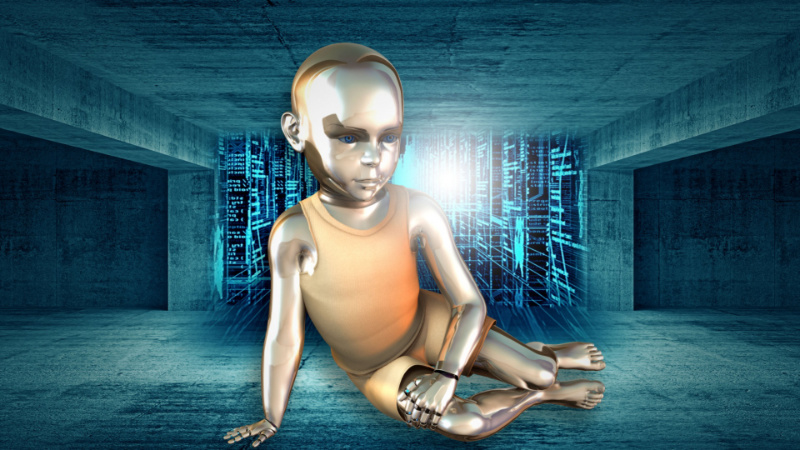
Now officially, these CAPTCHAs are used to make sure that websites and their services stay protected against all sorts of malicious actions.
As a Steemian you know that bots exist, sometimes these are used to game systems on websites for gaining some sort of intangible value or advantage through using automation - whether it is clicking a button every few hours to win minute amounts of cryptocoins, logging in to a market place for swapping currencies, or verifying your identity when you have forgotten your password to access an online service.
An unreasonable story
Recently though I have stumbled upon certain discrepancies in these CAPTCHA methods, discrepancies that warrant me to go off the official explanation and start making up my own mind as to what exactly this mechanism is used for. And what we aren't told about it.
For one, if you visit faucet sites that pay out small amounts of crypto, you will be faced with weird and sometimes arbitrary mechanisms that differ a lot from the 'maybe understandable mechanisms' you find on more serious sites (where you are asked a simple mathematical question for instance.)
Let me give you an example:
I have started using a crypto faucet a few days ago and after so many times jumping through the hoops of 'proving I am human', I find certain things odd about it. I have noticed weird patterns, and these patterns are hardly there by accident – after all, someone has programmed these methods with specific code and on specific instructions by the team who has decided upon them.
The CAPTCHA is sometimes just a box you have to check, then other times it will open up a picture of a neighborhood, asking you to "select all vehicles". In the beginning this seemed simple enough for proving I am not a bot, because bots would have a harder time discerning single objects in the image with the same colors, different sizes and shading – especially considering the pictures are often low resolution.
However, I found out rather quickly that the check does not really take itself too seriously at all. I would select all relevant squares in the picture where cars would be shown, but somehow this answer was not satisfactory to the CAPTCHA popup, asking me to try again with a different picture... which would mildly annoy me. If I wanted to continue I needed to find out what the damn thing wanted from me.
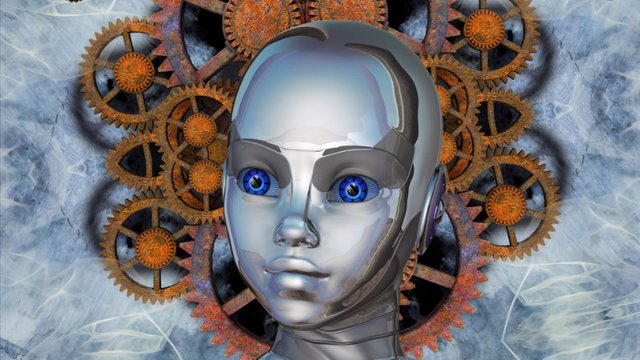
After a week of revisiting such a site I have found that bumpers, tires, even parts of the chassis apparently do not 'qualify' as "vehicles", neither do the small cars far off in the distance. So, oddly you are forced to 'learn' the way this CAPTCHA wants you to answer, eventually picking up on its 'personal preference' as to what counts as a vehicle and what doesn't.
I can only imagine the effect this might have on kids or elderly people thinking they are becoming senile.
Rewiring associations
With other tasks I feel there are weird concept tactics going on, well beyond the scope of proving I am not a robot. For example, it will ask me to please select a "Wohnhaus" - a "living house" (which is a literal translation I made for you, a common German word that implies a house someone would live in.)
Now, the thing about the 'right' selection to this task is reinforcing a certain notion: I never saw a regular house people used to live in, like a family house with two stories or a front yard or a driveway. Instead the 'right answer' to selecting the 'living house' was always (!!!) shabby, rundown apartment complexes where half a dozen families would live in, most likely in poverty.
This made me become somewhat used to the notion that "this is where people live or should live", which is really a form of conditioning if you are honest about it. Certain words are connected to certain images here, and by repeatedly acknowledging their correlation, you are – maybe on a subconscious level – rewiring your understanding of what a living house is.
Now, there are specific German terms for these types of dwellings as opposed to a "living house". Like "row-house" ("Reihenhaus") for example, which implies more than one apartment in one house with multiple families sharing the same roof.
However, more accurate words like this are never used in these CAPTCHAS, despite their massive usage on all sorts of websites today. One might think they would take better care when programming this for millions of users.
I am venturing to say, these CAPTCHAs are ways of getting people used to answering a certain way, as well as establishing certain associations in regards to a specific term. Repetition will then ingrain that connection over time, eventually causing a bias in relating to words and our everyday surroundings in a way determined by unknown programmers.
We have rules here, but then again we don't really
The weirdest thing lately was discovering that the answers often do not seem to matter at all!
I have had it happen that I am asked to select all 'living houses' when only highways, cars and traffic would be shown. I would select the most obvious parts of cars (having learned the CAPTCHAs "car-preferences" already, as mentioned in point 1.) and guess what?
The answer was correct anyway, and it let me go on to collect a few pieces of crypto. If this isn't a mechanism to further cognitive dissonance I really don't know what is.
These screenshots show it the other way around: I am asked to select all vehicles, go on to select parts of street signs, aaaaaaaaaaaaaaaaaaaaand it accepted it...
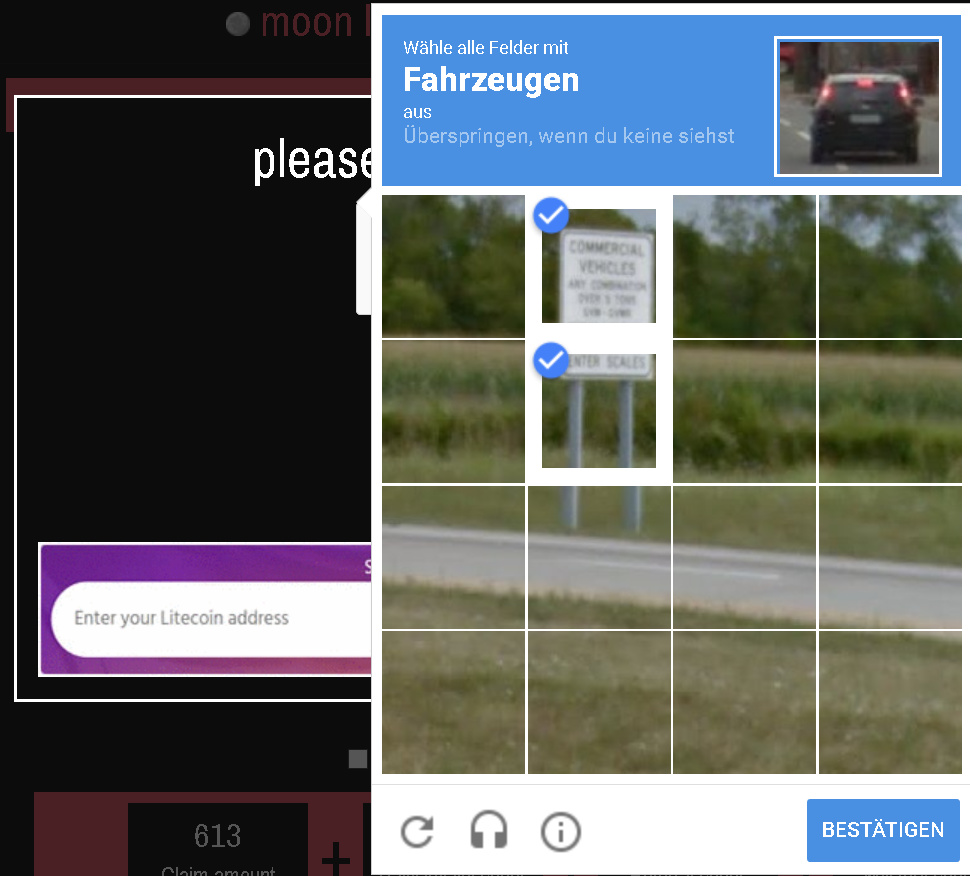
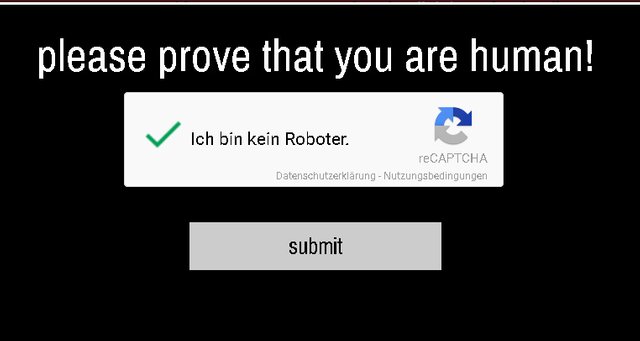
I have a hard time understanding how ads will pay for online services to begin with, when they are obviously more correlated to SPAM than any useful product someone would want, go on to buy or eventually use, right then and there when they saw the ad.
But when it comes to these CAPTCHAs I literally feel it serves a different purpose altogether than 'securing a network' from bot attacks. (Not to mention the fact that some websites state they have been gamed recently, despite having these CAPTCHA mechanisms in place.)
I am pleased to remind you that the 'terms of service' underneath the CAPTCHAs point directly to Google.
Big G again! Boy oh boy, that company, of all the companies out there, what a surprise ;)
It seems to me, we have long gone past the point of "do no evil"... OR "don't be evil" as it has been recoined I guess. And that company certainly has enough programmers to do it right, were that the actual task here, but I think it isn't.
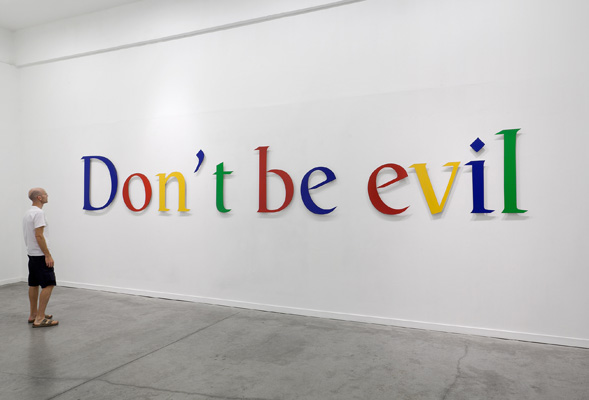
I also take issue with the very term CAPTCHA, what a weird word that did not seem to exist back then. They always make up new terms, but the final choice on a term often makes me suspicious. If I look at the word, it does remind me of the American "GOTCHA!" or the term "capture". Some sort of word-spell hybrid, it's eerie.
Question is, is it about capturing the right parts of the image to qualify, or is it more about capturing our minds, making us jump through more and more ridiculous and illogical hoops for that potential breadcrum at the end, until two generations down the line everyone using these services will be totally removed from reality?
"No no, I assure you, I am really a human"
The most hilarious thing though is, that after having done this for a week, I honestly do not believe wih absolute certainty anymore that I am 'NOT' a robot. I have certainly started feeling like one!
One can not expect me to check that box and then go on to do a robot's task daily, yet that is precisely how it is set up;) I am basically contradicting myself in continuing to act this way.
By doing a robotic task I "prove" to them "that I am human".
What a convoluded way of using terms. It has legalese written all over it. Acknowledgement of something that is actually not what it appears to be at all. And yet here I am doing it... all for some promise of having a stake in a future explosion of value in a cryptocurrency to invest into something sustainable and sensible...
Like gambling.
It has started feeling more like a distraction - like turning on the television or listening to the radio news, hearing about terms like "Freedom" and "Peace" when the anchor is actually describing how half a dozen missles have blown apart thirty "terrorist affiliated" families in one attack.
This captcha-faucet trap will lure in people thinking themselves more intelligent than those chasing the carrot on a stick that regular TV adverts promise (like million dollar cars to impress your neighbor).
I'm not sure the carrot is altogether different.

publicdomainpictures.net
publicdomainpictures.net
moonliteco.in
publicdomainpictures.net
findthemoat.com
Thanks to @chiefmappster, this great article was highlighted in today's edition of The Daily Sneak.
Thank you for your efforts to create quality content!
wow thank you so much @sneakyninja
I really appreciate that information <3 <3
I really enjoyed this. I can't say I have ever had experiences like the one you described with CAPTCHAs, but nor have I ever used a "crypto faucet" whatever that is. I am imagining standing under a nice hot stream of bitcoins in the morning and sudsing off with a little ETH.
So... you are a robot right?
Love - Carl
I am somewhat fighting becoming one, ahahaha. Washing off with Eth might sound like a good idea, especially after my bitcoin blunders which I haven't yet mentioned.
Thanks for your feedback Carl <3
The Google captcha are actually used to train their image recognition AI's by crowd sourcing large datasets of image tagging for the bots to compare against. Sometimes you get fresh images with little tagging already, so any boxes are accepted. At other times they have a mix of tags that are conflicting, so if your answers differ from normal too much, you will get a second control set that is when it actually verifies your humanity.
I often fail the first set but never the second set.
Not sure I buy that, but thanks for the information joseph.
I have a hard time imagining that millions of people clicking on squares with cars in them will be of great benefit to big G. I tend to not underestimate them anymore, and I think they're well beyond that point already.
Just my gut feeling.
Having said that, the moment they start asking me to 'identify all muslims' or some other group, we should get scared ;)